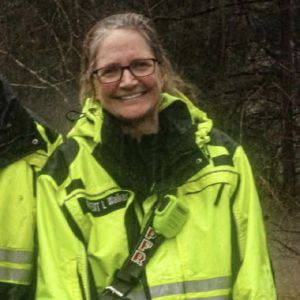Opinion: I can hear my clock ticking, but New Hampshire won’t grant my wish of being able to die at home

In this May 10, 2019, photo, Robert Fuller, center, leans on his walking stick and closes his eyes as he listens to music at a party in his honor in Seattle. He later became one of the hundreds of people who have used Washington's Death with Dignity Act to end their lives in the decade since it became law. (AP Photo/Elaine Thompson) Elaine Thompson
| Published: 04-14-2025 8:53 AM |
William Politt lives in Weare.
HB254 having been “laid on the table,” the political debate over medical aid in dying appears to be over until next session. The ethical debate continues and will remain with us until the bill can come up for consideration by our legislators again.
Despite a reasoned case in favor made by Professor Mitchell Simon in his 3/20 My Turn, the nays have carried the day for now. Opponents of the bill seek to protect the elderly, as indicated in Chuck McGee’s March 17 letter; disabled citizens, as Lori Safford highlighted in her March 21 letter; and veterans, as Andrew Breuder noted in his April 1 letter.
From whom do these folks need such protection? Overeager doctors? Avaricious insurance companies? Disgruntled relatives? Everybody deserves protection by our legal system, but are we so bad at self-government that a bill can’t be written that safeguards those people’s particular needs?
When my father died suddenly, my mother was left with the sole responsibility of raising me, age 8, and my sister who was not quite 15. She handled the task beyond admirably, and when her last nestling was ready to fly off, she sold her house outside Boston and moved to Florida. She lived there, the very model of an active, independent senior, for nearly 30 years.
She cooked and cleaned, and she enjoyed dining out. She went to shows, played piano at a senior center where she was older than most of her audience, traveled with friends and visited her sisters who had also moved to Florida. She flew back North to attend weddings and other family events. She put up visitors, and she never tired of telling people, “Stay out of my kitchen.”
Then, in the fall of 2000, she learned she had pancreatic cancer. The disease progressed quickly, and in about six months she was dead. Her final weeks created memories I wish I could shed. She spoke of unbearable pain, the worst she had experienced in her 96 years. Despite ever-larger doses of morphine, the pain was intractable. Had somebody in the Florida of 2001 been able to offer her an end to her suffering, I have no doubt she would have said, “Yes.” But, alas...
I’ve always been aware of how much I owe to her, among them my hair and eye color, love of music and of numbers (higher math not so much) and a perpetual readiness to laugh. I’m less grateful for our shared Graves’ Disease, and I’ve cursed her cold hands for my entire adult life, learning only recently that that, too, had a name: Raynaud’s Syndrome.
Article continues after...
Yesterday's Most Read Articles
 Former superintendent of the year is resigning to become EMT amid rising political attacks on schools
Former superintendent of the year is resigning to become EMT amid rising political attacks on schools
 Unique fiberglass home in Hopkinton is changing hands
Unique fiberglass home in Hopkinton is changing hands
 ‘We honor your death’ – Arranging services for those who die while homeless in Concord
‘We honor your death’ – Arranging services for those who die while homeless in Concord
 Two of five Grappone auto franchises to be sold as part of family transition
Two of five Grappone auto franchises to be sold as part of family transition
 GOP lawmaker wasn’t fired over transgender bathroom comments, business owner says
GOP lawmaker wasn’t fired over transgender bathroom comments, business owner says
 From raising chickens to programming a VR game, Merrimack Valley High School students show off their senior projects
From raising chickens to programming a VR game, Merrimack Valley High School students show off their senior projects
And now this.
Last summer I was diagnosed with stage 4 pancreatic cancer. I am without adequate words to thank my team at Dartmouth-Hitchcock, and I’m happy to report that the chemotherapy regime has done a good job of keeping my cancer in check. But I can hear the clock ticking. It’s only a matter of time until therapy gives way to hospice care.
And then what?
I have investigated Vermont’s Act 39, their death with dignity law, and am about to look into Maine’s similar provision. Although both provide the ability to avoid the agonies I so clearly remember my mother experiencing, neither will grant me the wish of being able to die at home, perhaps in the yard, smelling the roses and listening to the birds.
Unless the proponents of HB 254 succeed next time, I will continue to find myself under the very much unwanted “protection” of those who talk compassion and deliver cruelty.







 Opinion: The uniqueness of American imperialism
Opinion: The uniqueness of American imperialism Opinion: The Declaration of Independence is the antidote to Project 2025
Opinion: The Declaration of Independence is the antidote to Project 2025
